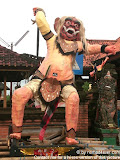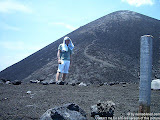 Found this sign in Jalan Teuku Umar Barat in Bali and it left me a bit puzzled. Are Australians really authentic native English Speakers?
Found this sign in Jalan Teuku Umar Barat in Bali and it left me a bit puzzled. Are Australians really authentic native English Speakers?
I mean, of course our beloved Aussies grow up speaking English as their first language. But is that the real, authentic English you want to learn to improve your language skills, mate?
What is authentic language anyway?
Is it like asking a Bavarian to teach you German: “Yo mei? O’zapft is!”. Or a Swiss or Austrian?
How about a Balinese to teach you Bahasa Indonesia? Or a Singaporean to teach you Singlish?
But then – why not?
Upon checking around the internet a bit, I found that there is really some confusion about this subject – even in the English Language Teaching industry and TESL organizations – what are considered authentic native speakers.
You have English spoken as the first language in Britain, Australia, USA, New Zealand and parts of Canada, while most post-colonial territories have English only as their second language. Although dialects, spelling and variations of the language can differ substantially, grammar and core vocabulary are mainly the same.
So the close proximity of Australia to Indonesia makes it surely easier to cater for authentic speakers from this region than flying in British nationals, who are willing to teach English.
And yes, it opens possibilities for English-speaking travelers as well. Living a bit longer in a country and earning some money by teaching English to fellow travelers or locals.
Do you want to learn English with an authentic native English speaker?
Give it a burl! You can learn English over a breakie or barbie, mate. That’s no skin off my nose, still ridgy-didge to me. G’day and good onya! ![]()
or save article to your Facebook with 1 simple click:




September 21st, 2008 at 4:32 pm
If a Lancastrian and Cockney are both considered ‘native speakers’ then so should an Aussie or an American.
We have no other tongue.
September 24th, 2008 at 9:25 pm
The funny thing is, I never managed to understand “native english speaking” people well. In London, I was really lost! They don’t speak the English that the rest of the world speaks! =) Funny huh?
September 25th, 2008 at 9:39 am
I don’t agree with your logic. Are you saying that only British people are only true native speakers of English? English in Australia is still English. Only the accent is different and some vocabulary varies, but this also happens within Britain itself!
October 7th, 2008 at 7:59 am
It’s not about native speakers from Australia (at least it’s English speaking country), but I think having the word “authentic” itself already shows the quality of the course (like saying ‘genuine diamond’ on Tiffany).
Having said that, on my trip to Saigon, our tour guide (a Vietnamese) spoke in a funny accent, mostly Australian and little bit American. Everybody thought it’s bizarre. Maybe, just maybe, he took the course at “Authentic English” place:)
Greetings from granite city.
October 13th, 2008 at 1:03 pm
I say old chap, poor show! This just isn’t cricket!
;)
October 25th, 2008 at 11:10 am
Right.. um hate to break it to you but if your first language is English then you speak authentic english… whether your from america, Australia, britian or New Zealand.. plus when I travelled to London I found less locals speak english than in Australia where every1 bassically speaks english
October 26th, 2008 at 3:54 am
English is also the first language of Ireland (not that we’re proud of that!)
November 4th, 2008 at 3:08 pm
With the number of Aussies in Bali and Indonesia, it probably makes more sense for Indonesians to learn “Aussie English”.
February 12th, 2009 at 7:56 pm
Hey guys, I am from the non-profit organisation that has established Authentic English. I had a good laugh when I read this. Just for your info, all the profits support a number of Balinese orphanages. Take your point about the name but we do mean well. Have a good one mate!
February 13th, 2009 at 12:38 am
Thanks guys for the heads-up! And Paul Edwards, no offense meant, pal! I see that you could laugh about it, so I assume, none taken.
February 19th, 2009 at 8:42 pm
Aww… On that point, we are putting up a network of home-based online ESL teaching here in the Philippines (we have Native Speakers from Australia and the US).
March 24th, 2009 at 11:27 am
almost the balinese need Australian english…..
not others…
March 24th, 2009 at 11:49 am
This is the teacher from Authentic English (AE) here…
We were quite surprised to find that we’d caused so much talk over a name…we did well then!
Glad you were interested in what we do here and it’s great teaching the Indonesians as well as helping those less fortunate through the organisation…
A point of interest is that most of my students have a hard time understanding me at first because of my Australian accent and they often learn a lot of their English from watching American movies and so find Americans the easiest to understand. It doesn’t take them long though to get used to my voice…
Another really interesting point is that they find the British accent the hardest to understand…
I’m not really fussed about the difference between AUS, US or UK English, I teach with Australian spelling and pronunciation but if they use US spelling I don’t mark it wrong or anything….it’s still correct in America!
I enjoyed your article, made me laugh and especially the come backs you got…good to know you can receive as good as you give…
Anyways, if you know anyone that wants to study English in Bali, tell them about us, we do run a quality program that caters for all different ages and needs…I’m passionate about my job and I love seeing people learn a skill that will open up bigger opportunities for them in their life.
Cheers!
March 25th, 2009 at 1:02 am
Sarah, you have some good points there! Most people in Asia really learn English from American movies and that’s probably the dialect they stick with.
By the way: I’m getting plenty of questions regarding Teaching English in Bali – especially here – though I don’t know much about it. Openings, probable salary, work visa or work contract. Could you or Paul Edwards please elaborate a bit further, if that’d be a real chance for foreigners to work in Bali? I can understand if that is asking you too much from my side.
Anyway – thanks for your great sense of humor and the friendly comment! And best of luck to your venture! =D>
April 2nd, 2009 at 3:59 pm
Hi again Chris,
As far as openings go, I’m not too sure. The biggest schools here are English First (EF) and I/A/L/F so if people went to their websites I’m sure there would be information there or they can email. My school has no openings at this stage.
Work visa etc is usually worked out as part of the contract and sorted by the English school…
ESL is in high demand so I’m sure the opportunities are around…you just have to go looking and do a bit of research…same as any other job. Also, the internet comes in really handy for information about that type of thing…again research…
April 2nd, 2009 at 8:57 pm
Sarah, thanks for answering that. That is good news for everyone interested in teaching English in Bali!
May 5th, 2009 at 11:54 pm
I have noticed that native speakers rarely use the formal English you learned in school? Most native speakers use casual English when they speak to each other.
May 13th, 2009 at 8:26 am
@ English student –
Yeah true that, but the worst part is – these so-called “native speakers” cant even spell right. When I went to Korea, a lot of teachers there (from UK, Australia, US, Canada, Ireland, and South Africa) cannot spell right. I am not the best speller or grammarian in the world but at least I know that pagoda is spelled as pagoda and not pogoda. Most of these “teachers” does not have a teaching degree, nor any experience in teaching – most are kids just fresh out of uni from countrytown, USA and first time to go abroad. One hagwon or language academy in Korea hired someone from Canada thinking he was an English native speaker, turned out the guy was Russian and only had his Canadian citizenship a few months before that – worst of all he lived in Quebec! The guy barely spoke any English. LOL. =)) English is an international language and is still rapidly growing and expanding and there is no such thing as Authentic English – hmmm – what is that? Queen’s English? American English? Aussie English? There are millions of Indians speaking their own brand of English, similar to the English in Singapore (which to me doesn’t sound anywhere close to English) and the English spoken by Filipinos (which can either be in varying accents like Californian/New York/Midwest USA or Aussie/British and of course Tagalog/Visayas accented English. Whatever it is, it is the First Language Influence – how your First language affects the pronunciation, grammar, etc of your adopted language. I think if you watch CNN now especially, you can hear these different accents of English depending on the speaker- but it is alright. I think if Asian schools hire “native speakers” of English, there should be heaps of qualifying exams and other criteria that needs to be checked. Proper grammar and spelling of course needs to be on top of the agenda and at least a decent teaching experience. if you keep sending trailer trash to Asia to teach English, then it is no wonder these poor people learn all the wrong things. It is okay if you don’t have the twang, it is okay if you can’t speak the way Americans, Aussies, Brits speak- as long as your delivery, diction and grammar is clear and can be understood, it doesnt matter.
Have you met an English Literature major who cant speak English, I have. Really pathetic. Tsk tsk tsk. LOL =))